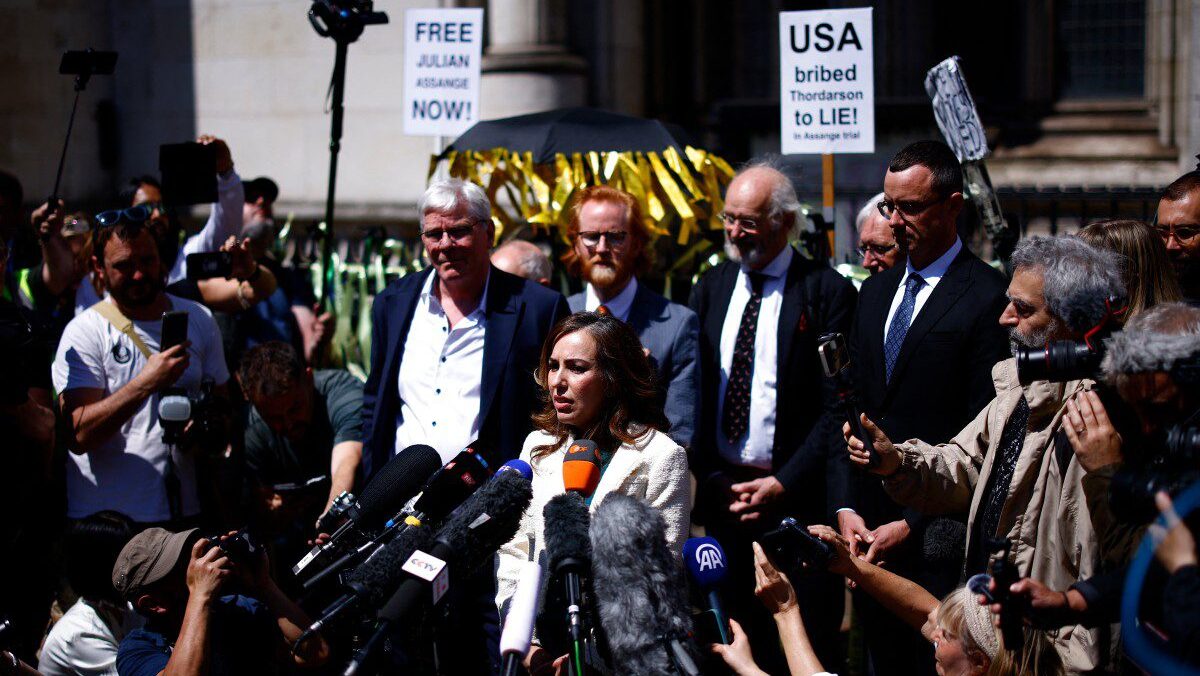
Stella Assange (C), the wife of WikiLeaks founder Julian Assange, addresses members of the media outside The Royal Courts of Justice, Britain’s High Court, in central London on May 20, 2024, after hearing the news that his bid to appeal against his extradition to the US had been granted.
Photo: BENJAMIN CREMEL / AFP
Wikileaks founder Julian Assange can appeal extradition to the U.S., a London High Court ruled on Monday, May 20th. Assange has been indicted on espionage charges after Wikileaks published classified U.S. documents almost 15 years ago.
“It took a few hours but the judges came to the just and right decision,” said Wikileaks editor-in-chief Kristin Hrafnsson.
“It took a couple of hours but the judges came to the just and right decision. Julian Assange has the right to appeal” – @khrafnsson, @wikileaks Editor-in-chief
— Free Assange – #FreeAssange (@FreeAssangeNews) May 20, 2024
Livestream: https://t.co/tOe9QXtAdC
Donate here: https://t.co/DZ0FVln2gE#MayDayMayDay #LetHimGoJoe #FreeAssangeNOW pic.twitter.com/ZICbZ98sBV
While Assange himself did not attend the hearing for health reasons, his wife Stella was in the courtroom. Outside the courtroom, she commented on the ruling by saying that American lawyers had attempted to put “lipstick on a pig—but the judges did not buy it” and said the U.S. should “read the situation” and drop the case.
BREAKING: Julian Assange granted partial leave to appeal extradition to the US #FreeAssangeNOWhttps://t.co/Y7C2lO80r7https://t.co/m1bX8STSr8 pic.twitter.com/dk9SGlQ7bd
— WikiLeaks (@wikileaks) May 20, 2024
In March, the High Court granted permission for Assange to appeal the extradition order unless the U.S. provided assurances that he would be able to rely on the First Amendment of the U.S. Constitution and that he wouldn’t be subject to the death penalty. If Assange was unable to rely on the First Amendment, the court said, his extradition could be incompatible with the European Convention on Human Rights, which provides free speech and media protections.
While conceding the American guarantee that the death penalty would not be on the table, lawyers for Assange argued that the U.S. had not provided assurances that he would be able to rely on First Amendment protections if extradited.
“The real issue is whether an adequate assurance has been provided to remove the real risk identified by the court,” attorney Edward Fitzgerald said. “It is submitted that no adequate assurance has been made.”
Attorneys representing the U.S. said nobody can rely on First Amendment protection when it comes to publishing “illegally obtained national defense information” while lawyers for the Wikileaks founder have consistently argued that, as a journalist, Assange was simply exposing U.S. military wrongdoing in Iraq and Afghanistan when his Wikileaks released over 90,000 documents relating to the war in Afghanistan, followed by 400,000 documents from the war in Iraq.
Assange has spent the past five years in a British prison after seven years seeking asylum in the Ecuadorian embassy in London. He has been fighting extradition to the U.S.—where his lawyers claim he could face a prison term of up to 175 years—since 2012.
